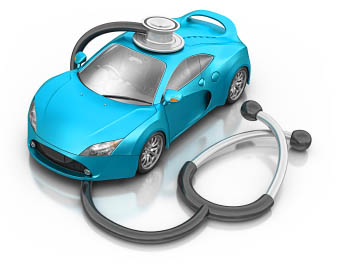
Integrated Vehicle Health Management
The concept of Integrated Vehicle Health Management originated in the aerospace industry, where component and system failures can be very costly. The basic idea is that the vehicle should be capable of monitoring the health of its own systems, and play an active role in scheduling its own maintenance. This reduces the chances of experiencing an unexpected failure and increases the reliability and useful life of the vehicle. In the past few years, the role of electronic systems in automotive safety has grown tremendously. Today's cars rely on various electronic systems to compensate for driver error or unexpected obstacles. Examples of some of these systems include electronic stability control, adaptive cruise control, automatic braking, lane departure warning and blind-spot detection. However, as automobiles begin to rely more heavily on electronic systems for passenger safety, it becomes increasingly important to ensure that these systems work reliably, and as intended, 100% of the time. Unlike aerospace systems that have multiple redundant systems that control virtually every aspect of the vehicle operation, automotive systems have fewer redundancies and rely more heavily on individual components to work reliably and/or fail in a safe manner. As a result, a failure in an automotive electronic system is much more likely to disable the vehicle. A major goal of integrated vehicle health management in automobiles is to recognize imminent failures before they actually compromise the performance or safety of the vehicle. For example, recognizing that a capacitor on circuit board had become degraded, or that a transistor is switching more slowly than it should; can alert the vehicle systems to a potential problem well before it becomes apparent to the vehicle owner. The vehicle can then alert the owner that maintenance will be required in the near future. The vehicle can also change or limit its own operation to prolong the life of the affected system, or prevent an unsafe condition from occurring when the component ultimately fails. Several projects in the Clemson Vehicular Electronics Laboratory support the ultimate goal of a robust and effective integrated vehicle health management system for automobiles. Clemson researchers are currently investigating the effect of various component failures on the health and safety of automotive systems. They are also investigating the effects of transients and electromagnetic interference on capacitors, CAN transceivers, and other common automotive circuit components. A project that is examining the characteristic electronic "pinging" of MOSFETs and IGBTs promises to identify imminent failures in power electronics and motor drives. Another project is focused on identifying imminent failures in alternators or generators by statistically examining data already collected by a number of systems in the automobile.
|
